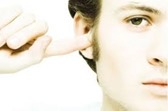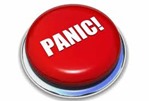 Tinnitus is a condition where people experience a ringing, humming, buzzing, hissing, chirping or cricket-like sound in their ears. Most tinnitus cases begin in middle age or older, however, due to an increase in younger people returning from combat, listening to loud music with unprotected ears in clubs, shows, or through head phones and through earphones, we are seeing a sharp rise in tinnitus among younger people.
Tinnitus is a condition where people experience a ringing, humming, buzzing, hissing, chirping or cricket-like sound in their ears. Most tinnitus cases begin in middle age or older, however, due to an increase in younger people returning from combat, listening to loud music with unprotected ears in clubs, shows, or through head phones and through earphones, we are seeing a sharp rise in tinnitus among younger people.
With tinnitus there exists a strong mind body-body mind interaction, with one influencing the other in a circular fashion. Here are the common symptoms that you may be experiencing if you have tinnitus. The good news is that Tinnitus Cognitive Retraining Therapy helps with practical strategies aimed at re-scripting, reframing and redirecting the negative thoughts that are responsible for maintaining anxiety and tinnitus at higher levels.
 1. Anxiety. Tinnitus sufferers almost always experience mild to severe anxiety because the brain frequently interprets any noise it doesn’t recognize as a potential threat or danger. As a result, the sound signals the brain to feel anxious. The problem is that it is precisely this anxiety that makes the tinnitus worse, creating a classic feedback loop or vicious cycle that is often difficult to break. The interventions of Tinnitus Cognitive Retraining Therapy are precisely designed to break this cycle.
1. Anxiety. Tinnitus sufferers almost always experience mild to severe anxiety because the brain frequently interprets any noise it doesn’t recognize as a potential threat or danger. As a result, the sound signals the brain to feel anxious. The problem is that it is precisely this anxiety that makes the tinnitus worse, creating a classic feedback loop or vicious cycle that is often difficult to break. The interventions of Tinnitus Cognitive Retraining Therapy are precisely designed to break this cycle.
 2. Fight-or-Flight Response. After becoming anxious over a perceived threat, a biochemical cascade of stress hormones are released, creating fight-or-flight response. The most prominent of these is adrenaline. The physiological reaction is a natural response, but its symptoms can be very anxiety provoking. They may include rapid heartbeat, flushing, and trembling. Tinnitus Cognitive Retraining Therapy effectively helps to interrupt this response.
2. Fight-or-Flight Response. After becoming anxious over a perceived threat, a biochemical cascade of stress hormones are released, creating fight-or-flight response. The most prominent of these is adrenaline. The physiological reaction is a natural response, but its symptoms can be very anxiety provoking. They may include rapid heartbeat, flushing, and trembling. Tinnitus Cognitive Retraining Therapy effectively helps to interrupt this response.
 3. Panic Attack/Fears. Sometimes when tinnitus sufferers start having trouble breathing or increased heart rate from anxiety over the fight-or-flight trigger, they begin to worry they are having a heart attack or are going to die. This fear ramps up the anxiety level even more, which increases the tinnitus symptoms. Tinnitus Cognitive Retraining Therapy is very effective in preventing the circular thinking, which feeds into the panic attack.
3. Panic Attack/Fears. Sometimes when tinnitus sufferers start having trouble breathing or increased heart rate from anxiety over the fight-or-flight trigger, they begin to worry they are having a heart attack or are going to die. This fear ramps up the anxiety level even more, which increases the tinnitus symptoms. Tinnitus Cognitive Retraining Therapy is very effective in preventing the circular thinking, which feeds into the panic attack.
 4. Depression. Mild to severe depressive symptoms can be common with tinnitus. People commonly report that the constant noise they experience and the anxiety linked to it causes them socially isolate from people and normal activities. It is usual that you might stop going out to see family and friends, as well as stop doing the things you love to because nothing seems the same anymore. Not being able to do things you love can also cause you to feel depressed. Tinnitus Cognitive Retraining Therapy helps you to return to your normal activities. This is a very important part of the healing process because people just want to feel normal again. And anything you can do to feel normal again gives your brain a signal that you are okay. If you begin to feel that you are okay, your brain begins to enter a positive feedback loop! So when it comes down to it, how we define our reality is everything. Or certainly accounts for a big chunk of the puzzle.
4. Depression. Mild to severe depressive symptoms can be common with tinnitus. People commonly report that the constant noise they experience and the anxiety linked to it causes them socially isolate from people and normal activities. It is usual that you might stop going out to see family and friends, as well as stop doing the things you love to because nothing seems the same anymore. Not being able to do things you love can also cause you to feel depressed. Tinnitus Cognitive Retraining Therapy helps you to return to your normal activities. This is a very important part of the healing process because people just want to feel normal again. And anything you can do to feel normal again gives your brain a signal that you are okay. If you begin to feel that you are okay, your brain begins to enter a positive feedback loop! So when it comes down to it, how we define our reality is everything. Or certainly accounts for a big chunk of the puzzle.
 5. Negative Thinking/Hopelessness. Untreated, the psychological consequences of ongoing tinnitus frequently produce negative thinking and hopelessness. In fact, some mental health professionals find that negative thinking is one of the principal hallmarks of the condition. Thoughts like, “Things are never going to get any better, my life will never be the same, I don’t have any more pleasure out of life and more…” are very common with tinnitus sufferers. The problem is, thinking hopeless thoughts increases the stress level, which is fuel for the tinnitus and gets you right back onto the negative-thinking feedback loop.
5. Negative Thinking/Hopelessness. Untreated, the psychological consequences of ongoing tinnitus frequently produce negative thinking and hopelessness. In fact, some mental health professionals find that negative thinking is one of the principal hallmarks of the condition. Thoughts like, “Things are never going to get any better, my life will never be the same, I don’t have any more pleasure out of life and more…” are very common with tinnitus sufferers. The problem is, thinking hopeless thoughts increases the stress level, which is fuel for the tinnitus and gets you right back onto the negative-thinking feedback loop.
 6. Suicidal thoughts. Although the vast majority of tinnitus sufferers aren’t suicidal or try to commit suicide, they may experience morbid or suicidal thoughts. Thoughts could be something like, “If I have to live like this for the next 40 years, I would rather die.” The good news is that you don’t have to live this way for the next 40 years. Tinnitus tends to improve over time and Tinnitus Cognitive Retraining Therapy helps by speeding the healing process by helping you to stay out of the emotionally reactive mode, which is responsible for pressing your stress button.
6. Suicidal thoughts. Although the vast majority of tinnitus sufferers aren’t suicidal or try to commit suicide, they may experience morbid or suicidal thoughts. Thoughts could be something like, “If I have to live like this for the next 40 years, I would rather die.” The good news is that you don’t have to live this way for the next 40 years. Tinnitus tends to improve over time and Tinnitus Cognitive Retraining Therapy helps by speeding the healing process by helping you to stay out of the emotionally reactive mode, which is responsible for pressing your stress button.
 7. Insomnia. One of the main complaints of some tinnitus sufferers is that the condition sometimes affects their ability to sleep. This is a can be a vicious cycle, as the less sleep you get, the higher the tinnitus may increase. The good news is that part of the Tinnitus Cognitive Retraining Therapy protocols address many sleep hygiene issues. I personally work with you to develop simple but effective self-hypnosis techniques to help you condition your brain to sleep better. These techniques can also be a big help in slowly tapering off of prescription sleep aids.
7. Insomnia. One of the main complaints of some tinnitus sufferers is that the condition sometimes affects their ability to sleep. This is a can be a vicious cycle, as the less sleep you get, the higher the tinnitus may increase. The good news is that part of the Tinnitus Cognitive Retraining Therapy protocols address many sleep hygiene issues. I personally work with you to develop simple but effective self-hypnosis techniques to help you condition your brain to sleep better. These techniques can also be a big help in slowly tapering off of prescription sleep aids.
 8. Crying spells. Tinnitus sufferers often find they cry at things that never made them cry before. It may be a sad movie or frustrations and fears about the tinnitus itself. Crying spells are also common symptoms of depression. However, left unchecked crying spells may actually exacerbate depressive symptoms. Tinnitus Cognitive Retraining Therapy helps you to observe, reframe and rescript thoughts fueling depressive thoughts causing crying spells.
8. Crying spells. Tinnitus sufferers often find they cry at things that never made them cry before. It may be a sad movie or frustrations and fears about the tinnitus itself. Crying spells are also common symptoms of depression. However, left unchecked crying spells may actually exacerbate depressive symptoms. Tinnitus Cognitive Retraining Therapy helps you to observe, reframe and rescript thoughts fueling depressive thoughts causing crying spells.
 9. Post-Traumatic Stress Disorder (PTSD). People often feel traumatized by the symptoms of tinnitus. As a result, tinnitus itself may also cause symptoms of PTSD (Posttraumatic Stress Disorder). As previously stated, the brain automatically interprets the perceived sound as a danger, triggering the production of stress hormones including adrenalin. The repeated cycle causes fight or flight jitteriness or anxiety or panic attacks. In other words, the brain and body are responding as if the danger were real. Similarly, persons with PTSD will respond to things that aren’t threats, as potentially dangerous situations. They may be easily startled, worry constantly, feel that they are dwelling or obsessing about things and/or experience anticipatory anxiety and bad dreams.
9. Post-Traumatic Stress Disorder (PTSD). People often feel traumatized by the symptoms of tinnitus. As a result, tinnitus itself may also cause symptoms of PTSD (Posttraumatic Stress Disorder). As previously stated, the brain automatically interprets the perceived sound as a danger, triggering the production of stress hormones including adrenalin. The repeated cycle causes fight or flight jitteriness or anxiety or panic attacks. In other words, the brain and body are responding as if the danger were real. Similarly, persons with PTSD will respond to things that aren’t threats, as potentially dangerous situations. They may be easily startled, worry constantly, feel that they are dwelling or obsessing about things and/or experience anticipatory anxiety and bad dreams.
 10. Exhaustion. Tinnitus sufferers experience exhaustion because of several reasons. One is the lack of sleep, which sometimes accompanies tinnitus. Another cause of exhaustion is the release of hormones your body produces in moments of anxiety, during a panic attack, PTSD, or during a fight-or-flight trigger. The adrenal response, and the body’s biochemical efforts to counterbalance the adrenaline leaves you feeling drained. Tinnitus Cognitive Retraining Therapy helps retrain the brain, so that over time the adrenal stress induced response to the tinnitus is greatly reduced or eliminated.
10. Exhaustion. Tinnitus sufferers experience exhaustion because of several reasons. One is the lack of sleep, which sometimes accompanies tinnitus. Another cause of exhaustion is the release of hormones your body produces in moments of anxiety, during a panic attack, PTSD, or during a fight-or-flight trigger. The adrenal response, and the body’s biochemical efforts to counterbalance the adrenaline leaves you feeling drained. Tinnitus Cognitive Retraining Therapy helps retrain the brain, so that over time the adrenal stress induced response to the tinnitus is greatly reduced or eliminated.
 11. Difficulty resting. The body’s natural response to stress caused by the tinnitus may result in lack of rest and sleep. If untreated, the stress, anxiety, and lack of rest may get worse, and a vicious cycle begins. TCRT utilizes some simple, effective self-hypnosis techniques to help the brain relax and get to sleep. Over time TCRT will help to break the cycle by retraining the brain not to perceive the noise as a threat, resulting in more restful sleep.
11. Difficulty resting. The body’s natural response to stress caused by the tinnitus may result in lack of rest and sleep. If untreated, the stress, anxiety, and lack of rest may get worse, and a vicious cycle begins. TCRT utilizes some simple, effective self-hypnosis techniques to help the brain relax and get to sleep. Over time TCRT will help to break the cycle by retraining the brain not to perceive the noise as a threat, resulting in more restful sleep.

